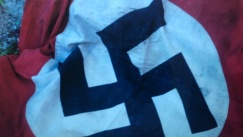View from the fields around Bulson down to the valley of the Meuse. I’ve just returned from a recce trip to the area around Sedan and the Ardennes in eastern France and southwestern Belgium. I was retracing, as much as I could, the route that German Army Group A used in May 1940. And I […]
WW2History.com News
| 2 April 2011The Open University
At the Barbican I was fortunate enough to receive an Honorary Doctorate from the Open University at a degree ceremony in London today, where hundreds of OU graduates also received their degrees. This is what I said in my speech to say Thank You. It is a particular honour for me to receive this award […]
WW2 Competitions
| 1 April 2011Competition winner – March
Well done to all of the WW2History.com subscribers who knew the correct answer to last month’s competition – which was Dietrich Eckart. The question wasn’t at all easy and yet many people got it right – so this month’s question about Charles De Gaulle is the hardest yet. Good luck! And congratulations to Caitlin Kilby […]
WW2 Anniversary
| 26 March 2011Fighting in the desert
The desert of Libya Seventy years ago this month, the most brilliant German battlefield commander of the war, Erwin Rommel, was fighting over the exact same territory in Libya as the rebels are today. Rommel, who had only arrived to take up command of German forces in North Africa just days before, led in March […]
WW2 Relevance
| 19 March 2011Gaddafi and the Nazis
Hitler in the Reichstag I’m normally extremely suspicious of any direct comparisons between events today and events in history. Rhetoric, at the time of the Iraq war, like ‘Saddam Hussein is another Hitler’ always made me irritated. No one is ‘another’ Hitler. Historical events and personalities exist only in the past and cannot be replicated […]
WW2 People
| 7 March 2011Bombing Japan
Tokyo, after the American fire-bombing in March 1945. We’ve just added onto the site for subscribers the testimony of Paul Montgomery who was a member of a B29 bomber crew during the war against Japan. I’ll never forget meeting Paul Montgomery nearly a dozen years ago on his farm in the flat lands of Oklahoma. […]
WW2 Competitions
| 1 March 2011February Competition Result
Here’s the result of last month’s subscribers’ competition. Congratulations to Mr Barnetson from Moray who correctly identified the name of the leader of the British delegation to Moscow in the summer of 1939 as Sir Reginald Aylmer Ranfurly Plunkett-Erne-Erle-Drax. A signed paperback copy of Richard Overy’s ‘The Road to War’ will shortly be winging its […]
WW2 Relevance
| 26 February 2011Why did the Germans fight to the end?
Much of Germany was in ruins by the time the Nazis gave up. Recent events in Egypt, Tunisia and now Libya have shown us how quickly dictatorships can be challenged and (in the case of the first two countries) overthrown. Which leaves us once again with one of the enduring mysteries of WW2 – why […]
WW2 Relevance
| 19 February 2011The thin line between life and death.
If you know a spitfire pilot – interview them now…. I gave a lecture yesterday at the literary festival held at the London School of Economics, where I am currently a Senior Visiting Fellow. I love the London School of Economics, there is an energy and a vibrancy there which – as my American friends […]
 Twitter
Twitter





